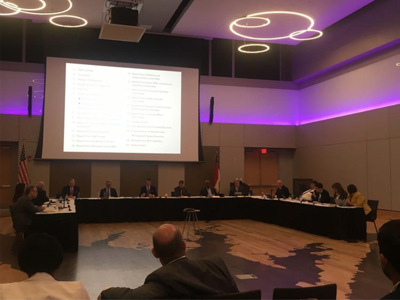East Carolina University’s Board of Trustees convened for its monthly meeting on April 2 over a video conference call, where five different committees met and discussed their goals for 2020 and how their departments will continue to operate under normal circumstances.
The Audit, Enterprise Risk Management and Ethics Committee spoke about how the university will handle sexual harassment cases on campus, both for faculty and students. LaKesha Forbes, the associate provost for equity and diversity, presented the discussion to the board.
Forbes outlined how the Office for Equity and Diversity handles cases of sexual harassment. She said it usually involves a staff member bringing the case to the Office for Equity and Diversity, and then anyone who brings an issue to light may seek retribution.
“We will have either the formal resolution process or an alternative resolution process, which allows the individual the option to resolve without going through the formal process,” Forbes said.
The University Affairs Committee chairmen Leigh Fanning spoke on the removal of UNC Center designations for the Center for Applied Pathophysiology and Pediatric Healthy Weight Research and Treatment Center.
Mike Van Scott, the interim vice chancellor for research, economic development and engagement presented a letter that asked for the removal of the UNC designation stated that the decision comes as a way to save the university money and allow for more freedom when making decisions about what the school wants to do concerning the Center for Applied Pathophysiology and the Pediatric Healthy Weight Research and Treatment Center.
“The request is due to a scope of activity, staffing and funding that is inconsistent with the expectations for a major center and does not justify the costs of maintaining the designation,” the letter said.
Student Government Association President Colin Johnson asked about retention in graduate programs. He said the first year retention rate for graduate students is above 80%. The College of Education is losing graduate students according to recent infographics, which according to Paul Gemperline may be due to the state legislature's decision to discontinue the 10% salary bonus for masters prepared teachers.
Acting Provost Grant Hayes then began the discussion about COVID-19, which touched on the faculty and staff response to the virus and how grateful he was for everyone’s cooperation with the changes.
“Our faculty, staff and students have really stepped up and have pulled a remarkable transition. Shifting from face to face instruction to totally online delivery. I am very grateful to all of their work implementing these changes,” Hayes said.
Vice Chancellor Virginia Hardy gave an update on COVID-19, mentioning that 31 students remain on campus. Hardy said student health remains open and tested some students for COVID-19 and that all test results came back negative for the virus.
The Athletics and Advancement Committee was presided over by Fielding Miller, a member of the Board of Trustees. The committee spoke on the review of operational metrics, then chair of the Board of Visitors, John Cooper, spoke on the new member appointments. All new member appointments for the BOV and reappointments were passed.
Director of the Athletics Department, Jon Gilbert, gave updates on Pirate Club funding and fundraising for the athletic department, which has not expired any altercations thus far.
The Finance and Facilities Committee headed by chair Bob Plybon spoke on a comprehensive budget report, and ERHA employee salary adjustments. The committee also gave an update on capital projects on and around ECU’s campus, which remain on track.
The final committee to meet, the Health-Sciences Committee, discussed how Vidant and the university are working together in order to prepare for the continued spread of coronavirus. Michael Waldrum, CEO of Vidant Health, said that they are currently prepared for the current trend concerning coronavirus.
“We are probably one of the best prepared to deal with the eventualities we are possibly going to face with the coronavirus,” Waldrum said.
Waldrum said that a 24-month timeline for the coronavirus is the most realistic, where there will be waves of higher infection rates, but he believes that this first spike will be the largest one.
Based on the models for the spread of the coronavirus currently available, Vidant will be prepared for the worst case scenario, but they will be stretching resources thin, according to Waldrum.
“We think we have enough ventilators for the worst-case scenario,” Waldrum said.
Waldrum said that the current worst scenario for Greenville would involve 900 to 1000 people being hospitalized with approximately 400 of those being on ventilators. As of April 2, there are 31 confirmed COVID-19 cases in Pitt County, according to the county’s website.







(0) comments
Welcome to the discussion.
Log In
Keep it Clean. Please avoid obscene, vulgar, lewd, racist or sexually-oriented language.
PLEASE TURN OFF YOUR CAPS LOCK.
Don't Threaten. Threats of harming another person will not be tolerated.
Be Truthful. Don't knowingly lie about anyone or anything.
Be Nice. No racism, sexism or any sort of -ism that is degrading to another person.
Be Proactive. Use the 'Report' link on each comment to let us know of abusive posts.
Share with Us. We'd love to hear eyewitness accounts, the history behind an article.